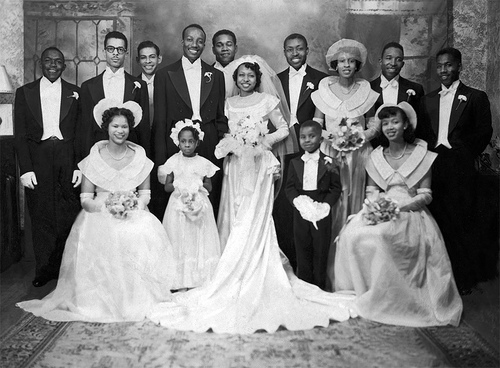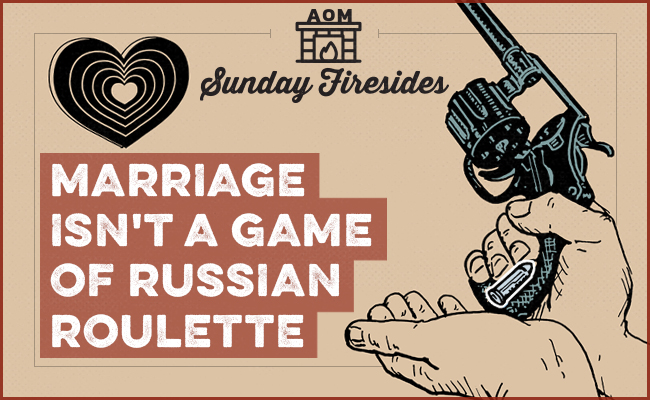
With our archives now 3,500+ articles deep, we’ve decided to republish a classic piece each Sunday to help our newer readers discover some of the best, evergreen gems from the past. This article was originally published in February 2017.
In the first few years of a relationship, you and your beloved’s brains are bathed with a heady cocktail of chemicals that make you feel positively high for each other. And you can’t imagine ever feeling differently. Those middle-aged couples who sit silently staring at each other at restaurants? That will never be you two. Those friends you know going through an acrimonious divorce? No way you’ll ever find yourself in their shoes. You guys are different. Your relationship is surely above average. You’re destined to beat the odds in every way.
You get married and several more years go by. You argue more and have sex a lot less. You don’t feel as close, and sometimes you do stare at each other silently while digging into a Moons Over My Hammy. You’re not unhappy, per se, but you’re not really happy, either. You kind of feel like platonic roommates who enjoy each other’s company; you get along alright, but there’s a lack of depth, richness, and ardor to your relationship. The old spark is gone.
While the arc of this common story might seem like an inevitability, it’s not. Research shows that romantic love can last. You can beat the odds.
How? Answers on this question abound, and are readily offered by friends and family, trained marriage therapists, and popular culture in general.
Unfortunately, a lot of the advice given through these well-meaning channels, even by the “experts,” just isn’t accurate.
The real secret — one that’s been scientifically-studied and research-vetted — to establishing and maintaining a happy and long-lasting relationship is actually gloriously uncomplicated. Easy, really. Even fun. In fact, it doesn’t even involve working directly on your marriage at all.
Instead, all you have to do is think about your relationship like a bank account — a kind of trust, that, if consistently funded with deposits of positivity, will keep your marriage in the “black” your whole life through.
3 Myths Around What Makes a Marriage Work
Before we get into why it is you should envision your relationship like a bank account, let’s take a look at some of the popular myths that exist around why marriages succeed/fail; as we’ll come to see, the power of treating your relationship as a positivity-funded bank account is exactly what makes them untrue.
Myth #1: Happy couples don’t fight.
Truth: Couples can fight a little, or a lot, and still be happy.
Research by Dr. John Gottman — who spent sixteen years studying what makes marriages thrive and fail in his “love lab” at the University of Washington and who famously possesses the ability to predict with over 90% accuracy whether a couple will end up divorcing based on watching them interact for just 15 minutes — found that happy couples don’t necessarily have less conflict in their marriage than unhappy ones. Some do indeed barely argue, and if they do, they do it quietly. But others fight frequently, and get loud and angry while they’re at it. Just like their unhappy pairs of peers, happy spouses still often have to broker a compromise between their different temperaments, values, and interests, and they still fight about the exact same kinds of things — money, kids, sex, etc.
And yet, somehow, their relationships still flourish.
Myth #2: Good communication and positive conflict resolution are the keys to a happy marriage.
Truth: A couple can be bad at communication/conflict resolution and still be happy.
Many times, if a couple is having problems, they go off to visit a therapist’s office. And what do they do there? Talk. Talk about their issues, their childhoods, the ways in which their partner has let them down. The therapist will facilitate these discussions, teaching the couple how to communicate with each other in a calmer, clearer, kinder way in hopes of helping them resolve their issues. Conflict resolution is seen as the end all, be all, of successful matrimony.
Learning the ins and outs of “clean” communication and how to effectively make your needs known in a relationship can indeed be beneficial. Discussing things calmly is certainly nicer and less blood pressure-raising than yelling and screaming. But, here again, Gottman’s research has shown that many couples don’t follow any of the rules of good communication and conflict resolution — they lose their tempers, don’t practice “active listening,” don’t couch their complaints in “I” statements — but are nonetheless happy all the same.
Myth #3: Marital unhappiness is created by spouses having unrealistically high expectations of each other/marriage in general.
Truth: High expectations are good for your marriage.
Yet how popular is this idea these days? You hear it all the time. According to its espousers, couples are unhappy because the wife grew up on rom-com fantasies, and even the husband thinks marriage is going to be a pretty smooth ride.
“Get real!” these folks say. “Marriage is hard! Everyone marries the wrong person, and then just has to make the best of it. Better to lower your expectations and accept this fact, than to get your hopes up and be disillusioned.”
Such an approach to marriage certainly has that satisfying tough-guy-realist thing going for it, but it turns out not to be based on reality at all. In The Seven Principles for Making Marriage Work, Gottman cites research, which his own studies confirmed, that in fact show the very opposite to be true:
Some marriage ‘experts’ claim that a significant cause of unhappiness in marriage is that husbands and wives have overblown expectations of each other. By lowering these expectations, the argument goes, you become less likely to feel disappointment. But Donald Baucom of the University of North Carolina has debunked this idea by studying couples’ standards and expectations of each other. He has found that people with the greatest expectations for their marriage usually wind up with the highest-quality marriages. This suggests that by holding your relationship to high standards, you are far more likely to achieve the kind of marriage you want than you are by looking the other way and letting things slide.
It’s sometimes said that anyone who thinks marriage is easy is either lying or delusional. But the whole argument that marriage is always hard and that you ought to consequently lower your expectations of it, comes off as sour grapes from those who are in difficult marriages, and want to believe that their situation is universal and inescapable.
It isn’t and it’s not.
Because we can say that after 15 years, two kids, and even running a business together, our own marriage continues to be the easiest thing in our lives — and we’re neither fibbing nor nuts. We know other couples who have found marriage easy too, and feel certain of both their honesty and sanity as well.
What’s the secret to having one of these undemanding marriages? Well, as we just discussed, it’s not a lack of fighting (we sometimes argue ourselves), nor a result of being adept at calm conflict resolution (said arguments can get heated and violate at least half of the rules of “clean communication”). Nor is it a matter of lowering your expectations (even after 15 years of marriage, ours still couldn’t be higher).
Instead, the secret sauce of making marriage a success lies in always keeping one’s “relationship bank account” flush.
The Importance of Your Relationship Bank Account
Nearly 70% of marital conflicts are perpetual and unresolvable — they’re ongoing and last the couple’s entire lifetime. Spouses tend to butt heads over the same things year, after year, after year.
If you believe that conflict resolution is the key to a successful marriage, this is pretty depressing news. It essentially means that almost no marriage can be happy.
But, if you follow Gottman’s research-backed philosophy, such issues are not a problem; in fact, he would say that friction is a natural part of the ying and yang of life in general, and of relationships specifically, and that some negativity in a marriage is actually healthy.
As long as it’s balanced by positive aspects.
Gottman has actually formulated a precise ratio for where this balance needs to reside for a marriage to maintain its stability and happiness: 5:1. A couple that has at least five times more positive interactions than negative ones will ultimately succeed.
Happy marriages thus aren’t conflict-free, they’re just infused with more positivity than negativity. This reserve of positivity acts as a buffer that mitigates and defuses the love-deteriorating effects of a couple’s conflicts — absorbing these negative ripples and keeping them from spreading and overwhelming the relationship. Gottman calls this dynamic “positive sentiment override.”
Another way to look at this balance is in terms of a kind of “relationship bank account.”
If a couple’s relationship bank account is running low on “funds” (there’s been more negative interactions for a while than positive ones), then each “withdrawal” (conflict) brings the balance on the account closer and closer to zero, or even towards an “overdraft.” Thus each argument feels weighty and fraught with peril — like it’s moving the relationship towards the brink of “bankruptcy” — a break-up or divorce.
If a couple’s account is overflowing with positivity, on the other hand, then they can afford to make occasional “withdrawals” without any danger of the funds going into deficit. Since there’s an ample safety cushion in place, when a withdrawal is made, it doesn’t feel like the stakes are all that serious. The idea that a conflict is moving them closer to divorce, or a sign that they’re not going to make it, is a million miles away — it isn’t even remotely on the table. An argument is just a dumb argument, and nothing more.
As Gottman puts it, the difference between couples in “positive sentiment override” as opposed to “negative sentiment override,” is that while the former “communicate to each other every emotion in the spectrum, including anger, irritability, disappointment, and hurt, they also communicate their fundamental fondness and respect. Whatever issue they are discussing, they give each other the message that they are loved and accepted, ‘warts and all.’”
Why the “Relationship Bank Account” Approach to Marriage Success Is So Effective
Increases repair attempts during arguments. Since those whose relationship bank accounts are in the black don’t experience their conflicts as high-stakes endeavors, sometimes the partners are actually self-aware enough in the midst of the confrontation to think to themselves, “Boy, this is a dumb argument.”
In fact, Gottman reports that one of the ways an ample relationship bank account most crucially strengthens a marriage is in the way it leads to the quicker and more frequent use of “repair attempts.” Repair attempts are little signals in the form of gestures or words — a smile, a laugh, an apology — by which one partner tries to break the tension of a conflict and keep it from spiraling out of control. In turn, when a couple’s relationship bank account is flush, the partner on the receiving end of a repair attempt is more likely to recognize it as such, and respond in kind. If you’ve ever had a heated argument with your significant other in which she smiled, then you smiled, and then you both laughed and were able to calm down and talk things out normally, then you’ve experienced how a repair attempt operates.
Keeps conflict from overwhelming the marriage. Maintaining a well-funded relationship bank account not only shortens arguments, it ensures that they are gotten over quickly and have little lasting effect. Couples with well-funded accounts can squabble and yet have so much positivity left over, they retain their love, admiration, and fondness for each other; they can fight and still like one another plenty.
Removes the pressure to practice “good fighting.” As long as you keep a reserve of positivity in place, you can fight “poorly” and still remain thoroughly committed and smitten with one another. How “good” you fight simply isn’t as important as the overall goodness in your marriage. This is quite advantageous, and a real relief, because, let’s face it, it’s hard to remember to make “I” statements when you’re about to blow your top.
Makes it so you don’t have to resolve all your conflicts and can instead learn to accept your partner’s faults. With the bank account approach to marriage, you don’t have to divide up and work on each of your conflicts/issues separately. In fact, you don’t necessarily have to try to resolve your sticky conflicts at all — another relief when the vast majority would never have been solvable in the first place! People rarely change; they can get a little better in managing their flaws, and together you can learn strategies for coping with them, but an issue that’s there at the start of marriage will probably be there until your golden years.
It’s fine to grieve that reality a little, but it needn’t be a cause of interminable mourning.
When your relationship bank account is in the black, your disappointment with your partner not living up to this or that expectation will largely be overridden by your admiration, respect, and fondness for the things they do well and that you cherish. While you do lower your expectations in some areas, you raise them in others, so that you still have an elevated, grateful, optimistic view of your marriage. Warts and all, you still like each other immensely and consider one another worthy of honor and respect.
Solves problems indirectly — including those concerning sex. Though the bank account approach to marriage makes it possible to live with conflict instead of fixing it, it does sometimes resolve issues outright. And it does so indirectly, without spouses having to work on the problem directly.
A good example of this is sex. If there are problems in the bedroom — say, one spouse feels like sex isn’t happening enough — simply talking about its lack of frequency is often a less effective approach to addressing the issue than what Gottman recommends: “Instead of isolating sex from the rest of your relationship, try a change in attitude. Stop thinking that sex is about orgasm and consider everything positive that happens between you as part of sex.” A reserve of positivity can go a long way towards enhancing what goes on the bedroom — and do so naturally and indirectly; as the slogan Gottman puts on t-shirts and mugs at his clinic declares: “Every Positive Thing You Do in Your Relationship Is Foreplay.”
Conclusion
When you view your relationship like a bank account, instead of working on what’s wrong with it, you strengthen what’s right, so that the positives overwhelm the negatives, diminishing their significance and impact on your love and happiness.
As Gottman puts it, his research taught him “that the key to reviving or divorce-proofing a relationship is not simply how you handle your disagreements but how you engage with each other when you’re not fighting.” By setting up a kind of insurance policy during the good times, you can weather the bad ones, and even prevent some storms from arising in the first place.
The real beauty of the “bank account” approach to sustaining a healthy, happy, stable marriage, is that it doesn’t require working directly “on” the relationship. Instead, you set up a trust fund that you and she each contribute to, which in turn produces dividends that flow back into your relationship. And as we’ll see, making deposits to this fund is more enjoyment than work.
Thus far, we’ve only described these deposits as “positive interactions.” But what exactly do they consist of?
That’s what we’ll cover next time.
Read Part 2: The Best Ways to Fund Your Relationship Bank Account
__________________________
Source:
The Seven Principles for Making Marriage Work by John Gottman
Tags: Marriage





